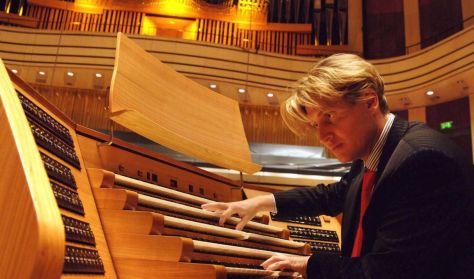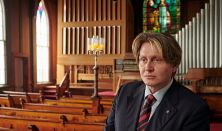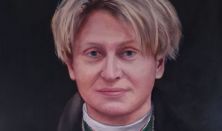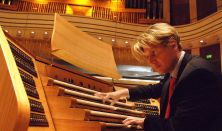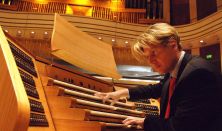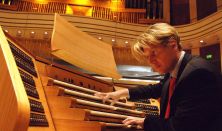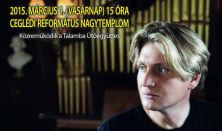Concert Organist
Xaver Varnus is to Hungary what Vladimir Horowitz was to Russia: a famous exile, recognized on the street, and pursued by autograph hunters in restaurants and even in swimming pools. Bus drivers brake when they see him walking on the streets of Budapest and pick him up between stops. But Varnus is neither a sports hero nor a rock star. He is a Canadian citizen who is also Hungary’s most acclaimed living classical musician and an institution in his native land. According to public opinion polls and newspapers, he is among the five most popular personalities in Hungary – it is nearly impossible to get tickets to his concerts. His autobiographical book, God Will Forgive Me; That’s His Job (1996) is a Hungarian best-seller. Varnus’s fame, based entirely on his recitals and his improvisations, is hard to imagine in the Western world. But it is altogether natural in a small country with a hyperactive cultural life.
Born in Budapest in 1964, he was the first child of a mathematician mother and a jazz pianist father. By the age of six, Varnus knew exactly what he would become. His first piano teacher was Emma Németh, one of the last pupils of Claude Debussy. He lit up the musical firmament of the world like a shooting star. At sixteen, he undertook his first concert tour of Europe. In 1981 Varnus left Hungary to study with the formidable Pierre Cochereau, the late organist of Notre Dame de Paris.
Varnus made his North American debut on 5 May 1985 to a three-thousand-strong audience at the Basilica of the National Shrine of the Immaculate Conception in Washington, D.C. He has played virtually every important organ in the world, including those in Bach’s Thomaskirche in Leipzig, Notre Dame, Saint-Sulpice and Saint-Eustache in Paris, and the Moscow Conservatory, as well as the largest existing instrument in the world, the Wanamaker Grand Court Organ in Philadelphia. In October 2005, he performed in concert to a full house of 4,000 people in Canterbury Cathedral in England. In 2006, to celebrate the 25th anniversary of his concert debut, he played a sell-out concert on the legendary Cavaillé-Coll organ in the Church of Saint-Sulpice in Paris. Later that year, he performed at the inaugural concert of the Palace of Arts in Budapest, one of Europe’s largest concert halls. Among the greatest European musical sensations of 2009 was the joint concert by the superb French jazz pianist Jacques Loussier and Xaver Varnus, who played twice to houses packed to capacity at the Palace of Arts. Perhaps the most daring concert Varnus has ever played was at the Budapest Sports Arena in 2011, when he appeared with the remarkable French jazz organist Rhoda Scott. Two hours before the concert, there was barely even a standing place left in the huge arena, where 14,000 people were gathered to listen to the two legendary improvisers’ fiendish virtuosity.
In 2013 Varnus opened the Berlin International Organ Summer playing the world-renowned organ in the Berliner Dom, and again there was not a seat to be had. In October that year, the International Organ Festival in Toledo began with his concert in the Church of Santo Tomé, where the queue to get in seemed to stretch for miles. However, fate reserved the most moving invitation for Varnus until 2014, when, near to his fiftieth birthday, Ullrich Böhme, organist at the Thomaskirche in Leipzig, suggested he play the famous Sauer Organ over the grave of the mighty Johann Sebastian Bach. There was a slight altercation in the crowd gathered in front of the church when the doors opened an hour before the start. A younger woman indignantly told an elder American man not to push as she had stood in line over an hour to get in. “Madam,” he replied, “I have been stood in line for 30 years to hear Xaver play in the Thomaskirche.”
Over many years, Varnus has evolved a practice of speaking to the audience from the stage, discussing the music and giving a new dimension to his concerts. Varnus is credited with bringing the music of Johann Sebastian Bach to young people with an innovative and exciting style although he has drawn adverse criticism from some fellow organists and music critics who found his approach too flamboyant. In 1992, he began a televised concert and lecture series at the Hungarian State Television. This was followed in 2002 by an extraordinary series of organ concerts for young people, which lasted for eight seasons. He is perhaps the most influential figure in Hungarian classical music in the early twenty-first century. Organist, improviser, author, lecturer and often controversial media personality, Varnus has had a dramatic impact on the popular audience’s acceptance and appreciation of classical music. Over the course of his career, Varnus has played to more than six million people worldwide, recorded fifty-one albums, made sixty concert films, and written five books. His videos have surpassed seven million views on YouTube. His quadruple platinum disc winning album From Ravel to Vangelis, released by Sony BMG in 2007, is the best-selling collection of organ recordings ever.
“In a world too long dominated by organists with little imagination, little talent, and little technique, Xaver Varnus, 22, who has gobs of all three, should make friends quickly.” These lines are by the distinguished North American critic Arthur Kaptainis, which appeared in The Montreal Gazette on 20 August 1986. Twenty years later, the leading Hungarian music critic Miklós Fáy wrote: “Xaver can talk the language of the people and has made thousands interested in his concerts. If anyone can make classical music attractive, he can. He can play the organ, he is cultured, and he is a thoroughly modern figure who can prove with his personality that Bach is listened to not just by losers, people who have missed out on everything and are trying to prove to themselves and each other in their own narrow circles that Bach, and not delusive appearances, is the real thing.”
A Canadian citizen since 1984, Varnus has been married twice, and has two children in Canada, Daniel (born 1985), who is a mechanical engineer, and Nicolas (born 1987), who is a professional snowboarder. Varnus spends much of his time at his official residence Villa Varnus, his family’s beautiful historical country estate near Lake Balaton in Hungary, as well as at his homes in Leipzig, Berlin and Toronto.
Varnus has received many honours, including the highest decoration for civilians in the land of his birth, the Grand Cross of the Order of Merit of the Republic of Hungary.
